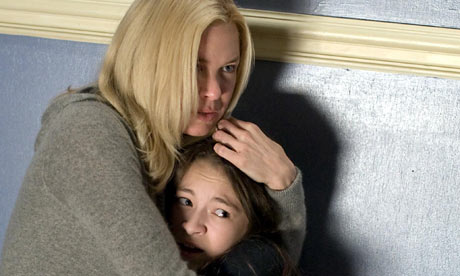Kid napping syndrome
http://www.guardian.co.uk/society/2010/mar/24/social-worker-abuse-online
Maybe they're just hooked on the power, like most in the Child Protection and divorcee industries.
Looks like blogging through a US server is the way to get around the evil secrecy laws of the Family Court.
-
- The Guardian, Wednesday 24 March 2010
- Article history

Renée Zellweger as a social worker rescuing a child in the film Case 39. Photograph: c.Paramount/Everett / Rex Features
The hounding of social workers by the press for being "baby-snatchers" if they take children into care is a predictable story. But now such persecution has taken a new twist with online campaigns by families protesting about child protection intervention.
A proliferation of blogs and pages on social networking sites have sprung up. In one example, a Suffolk family claim they were forced to give up their child for adoption, with no evidence of abuse. They went to Spain before the birth of their second child, who is now in the care of Spanish foster carers acting on information from Suffolk social workers.
In some cases, the blogs make for uncomfortable reading. Social workers and managers are named and vilified, accusations are hurled at councils, and court injunctions banning the identification of the families and children are flouted.
According to Hilton Dawson, chief executive of the British Association of Social Workers, websites devoted to attacking social workers are a growing problem. "They illustrate the difficulties of the social workers who are damned when they do and damned when they don't," he says. "We get many complaints from people who feel very threatened by the publication of sometimes vitriolic criticism of them, and really very unpleasant personal abuse."
Managers are almost powerless to stop what Simon White, director of children's services in Suffolk, describes as "floods of information about the council that is completely false and misleading".
Some of the blogs are hosted in the US, where the constitution's first amendment, guaranteeing the right to free speech, makes them all but untouchable.
White's concerns about the content range from the impact on the targeted social workers and the reputation of the council to the effect the content of the sites may have on the cases and the families involved. "There's quite a lot of abusive and personal stuff aimed at named individuals," he says. "Some is clearly defamatory, and obviously we have duties to those staff. And when you get into the wilder edges of it, you are sometimes worried about their personal safety."
White also fears that an online campaign might be contagious. "If it started to become commonplace that whenever we did a pre-birth conference, families would consider leaving the country, it would force a change in practice," he says. "We'd have to be much less open with families."
One Suffolk employee who has been named on a blog says the experience is not just personally upsetting but has a knock-on effect on other cases. "Other families are aware of what's being said and they will bring it up, and that's difficult, especially when people may be making sensitive decisions," the employee says.
The problem of online hate campaigns is not limited to Suffolk. White knows of at least three other councils that have been similarly targeted, and a quick trawl of the internet reveals links to families around the country keen to tell their stories. Myths about social services – that they get financial rewards for every adopted child, or that they are involved in conspiracies to remove families' children – are perpetuated.
"The vast majority of what we do is actually allowing families to stay with their kids, even when we've got very serious concerns," White says. "There were 38 adoptions in Suffolk last year. Of children who entered the care system, 45% went back to their parents in the same period."
White does not think there is much that can be done about the way information spreads, but he would like action beyond the individual local authority when allegations about conspiracies or financial inducements are made. "The profession, or the government, needs to respond," he says. "They need to defend the arrangements and processes, and put right mistakes and misapprehensions."
The BASW works constantly to address the myths about social work, Dawson says. He has recently written to every local authority in the country offering to help them communicate to communities and the local media what social workers do.
At a time when councils are struggling to recruit social workers, another reminder of the pressures of the job is the last thing they need. "This work is immensely demanding, personally and professionally, and it's difficult to retain staff at the front end," the Suffolk employee says. "Staff are concerned that the same sort of thing could happen to them."

 "Stunned, devastated, horrified etc."
"Stunned, devastated, horrified etc." 
